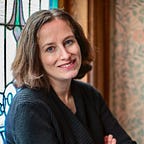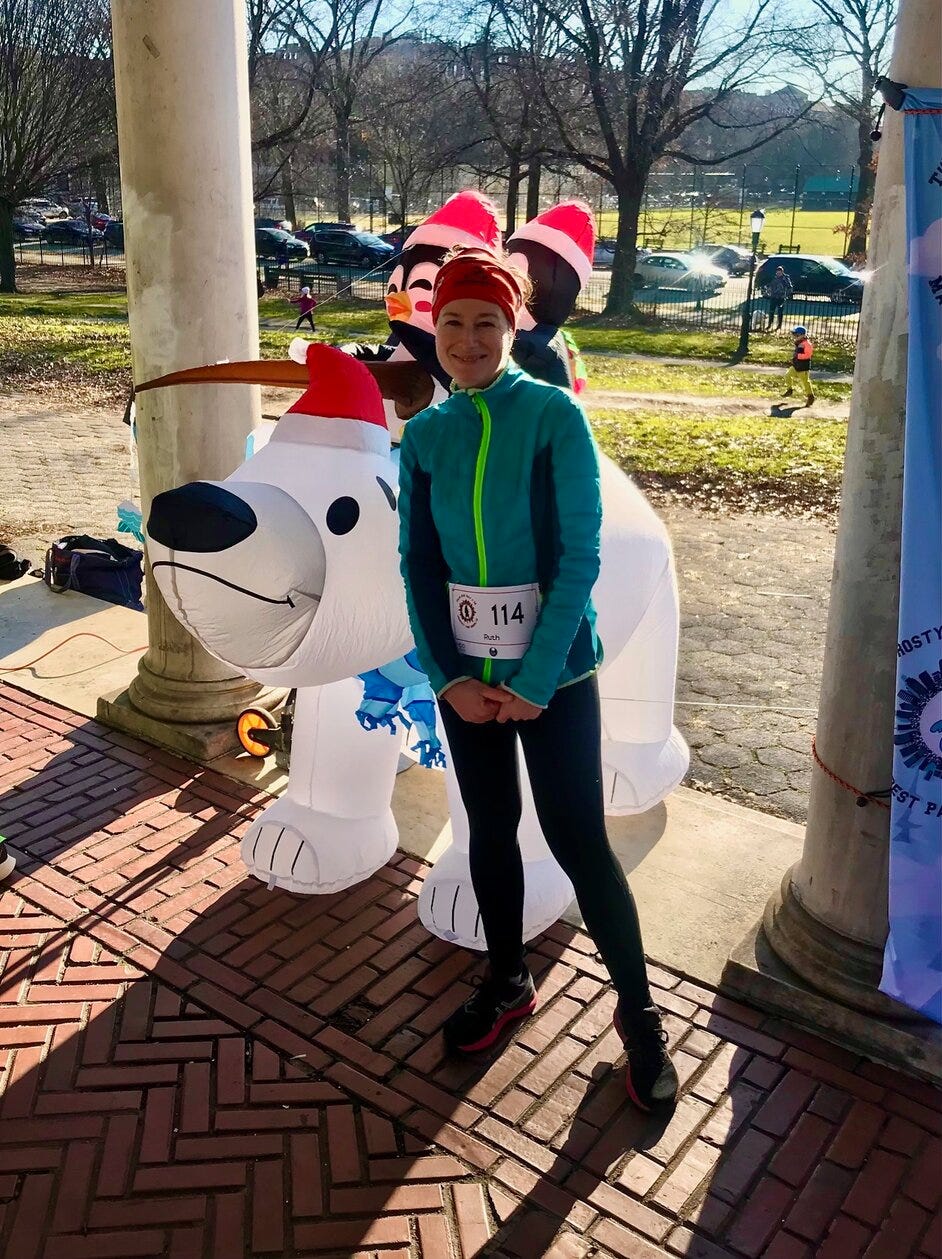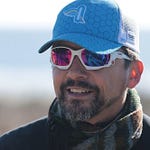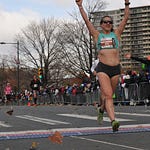You may remember a few months ago, when I put out a call to share your stories about how you became a runner and where running has taken you.
We’ve heard so many great stories so far, from Rosalie Chan, Erinn Connor, Ken Morrison, Colleen McBride, Chanse Carlson, and Debby Jones. And now it’s time to hear from another longtime THM reader, Ruth Franklin.
In this one, Ruth shares how she’s just getting back to running after a long hiatus, one that has included raising three young children. I also talk with her about her new book, The Many Lives of Ann Frank, which was released earlier this spring.
We got to talk about so many fascinating parts of Anne Frank’s story, about the writing of the book, and what it’s like to re-discover the joy of running and exercise, even in the smallest ways. I know you’ll enjoy Ruth’s story just as much as I did.
And if you’d like to share yours, please know that I’d love to hear it too! All you need to is reply back to me by email or in the comments below, and we’ll go from there. — Terrell
So, let’s hear a little bit about you! Who are you, your age (if you’d like to share), where you’re from, what you do, etc.
I'm a book critic. I write book reviews for magazines like The New Yorker, The New York Review of Books, and Harper's, and I'm also an author of books.
I've written two biographies, when the first one was called Shirley Jackson: A Rather Haunted Life, about the life and work of Shirley Jackson, the author of [the short story] “The Lottery” and some other American classics of suspense and horror and other genres. And yes, in the book you just mentioned, which came out in January, The Many Lives of Anne Frank, which is sort of, part a biography of Anne and part a cultural history of how she came to have the kind of iconic status she has today, and what that means to different people in different contexts.
How did you become a writer?
I did love to read and write as a child, and to be honest, if somebody had told me as a child that someday I'd be able to get paid for reading books, I would have thought that that wasn't even possible. So in a way, I am kind of living my childhood dream, but it's, you know, it's not always that rosy, of course! And being a freelance writer, especially in this economy, involves a fair amount of hustling, so I was on staff as an editor and writer at The New Republic for many years, back when that magazine was still in Washington, D.C., and then I got some support from grants that allowed me to strike out on my own and freelance full time.
Like many writers, I do a combination of things, you know, I freelance magazine journalism and book writing, and I also teach. I'm an adjunct professor of writing at Columbia University, where I teach in the creative writing program. So, but I started off, you know, just as a person who really loves to read and to talk about books. I actually did part of a Ph.D. in literature before deciding that I didn't want to write about books for an academic audience — that I wanted to focus on the general reader, the general public, and talk about books with regular, ordinary people who love to read.
Were you an athletic kid growing up? What are your early memories of what fitness and health were about?
I didn't always love it. I will say it took a while. I mean, I had always kind of wanted to be a runner. I grew up in the eighties, when it was first starting to become a thing. And I remember that guy, Jim Fixx and his book about running, which my parents didn't have it ourselves, but I must have seen it at a friend's house.
I got really interested in the idea of what it would of what it would be like to be a runner and, you know, to have that kind of meditative time and discipline, I think was what really appealed to me. And so that's why I went out for the cross country team. And I remember how hard it was, especially that first season — getting used to this new way of thinking about moving and sports.
I was not an athletic kid before starting cross country… it involved a whole kind of new mindset that I was a person whose body was able to do this, but I remember just starting to get used to the mileage that we had to do and all the other stuff — hill work, speed work. It was like learning a whole new vocabulary from my body. But after that first season, I was totally hooked on it, especially after I won my first race. That was it — such a great feeling.
I still sometimes think about the stuff that my cross country coach told me. I’ve told it to my kids — well, the few times that they've ever agreed to run with me! I [tell them], breathe in through your nose and out through your mouth.
How did you first get into running? Was there something that inspired you — like a performance at the Olympics, for example, or a runner you discovered by watching them on social media or TV? Or was there someone in your own life who inspired you to think, “maybe I can do this?”
I've run my whole life, since I started on the high school cross country team. I think of myself as a runner, even though I actually just started actively running again a couple of months ago, and I wrote a newsletter about it, because I actually started running with my dog, and that is a whole different kind of running I'm discovering.
So I've just started, and I have this new motivation, which is keeping my dog exercised and fit. But I've been running since I was 15 years old, give or take. And especially as I've had three kids, so I wound up taking time out for each, [for] pregnancy and recovery and but I think that's one thing that's great about running, is that it's sort of like an old friend.
You know when you're ready to come back to it, it's still there for you, and you can pick it up again. Maybe you're not exactly in the place that you were when you left off, but you know that you'll get back there.
Also so much of the work is mental, right? It's just believing that you can keep going for as long as you want to, and once you've taught yourself that you're able to do that, I think that's the part that you don't lose. You know, you may not be quite as fit as you were before, but you have the mental stamina.
How has your interest in running evolved since then? You run with your dog now, right?
I have a mutt. He's a little guy, he has short legs. People think he's part Corgi, but the DNA test did not so who knows? But he's also part Lab, most likely, and so he has sort of like a big dog's attitude and upper body on these little legs. And honestly, it never even crossed my mind that he would be a good running dog.
But then I started taking him to these parks where you can run off the leash, I saw that he just loves to run, and it's beautiful to see like, you know, I think maybe you probably, you know, as a runner, but you probably don't always feel like you love to run, right, just the joy in the motion you're doing it for other reasons that you appreciate, but like the animal, the animal quality of the delight in motion, I found so beautiful, and I think it rubbed off on me watching him.
Because I started thinking, “hey, you know, I haven't been running [in a while] because I’m oh, a woman in middle age who’s supposed to be lifting weights and doing less cardio. And I've been dutifully following all this advice. But this is fun — I like this.
How do you pick the the people you're you're going to write about? Especially because for freelance writing — say, a magazine assignment — that's one thing. But how do you pick something you're going to invest years of your life into?
It's kind of a complicated calculus of what kind of information is out there, my own interests and passions, and then what people are willing to pay for, right?
So you have to balance all of these things with Shirley Jackson. She just was one of those writers who always was a touchstone for me. Her book The Haunting of Hill House especially is just one of my absolute favorite books ever, and but it wasn't until around 2010 the Library of America brought out an anthology that was a collection of a very a diverse selection of her writing, so short stories and a couple of the novels and also some of her autobiographical work.
And until then, I hadn't known that she essentially invented the mommy blog form. You probably remember, you know that there's this big boom in the 2000s, with lots of internet writers writing about parenting, and Shirley Jackson was doing that in the 1950s, writing about her life as a mother, [as] a wife to an absent-minded professor, husband and mother of four kids in the small town [of] Bennington, Vermont. And it was really striking that the same person who was writing these classics of horror literature, was also writing these lighthearted little essays about her son's little league games.
So, I got really interested in who is the person behind these books. If there's one thing that unifies all my writing, it's the interest in the creative process. I'm just really interested in what leads a certain person to produce a certain work of art at that particular time in history. It's a combination of all those factors, personal motivation, plus historical and cultural and social circumstances, and then, like the spark that we call genius or creativity or whatever.
And I'm always really fascinated by that when I write profiles of writers, which is also something that I love to do, and that's what I'm always looking for in the biography as well. It's sort of the key to the imagination.
That's a perfect lead-in to your new book, which, for anyone who's not familiar with the book, it's it's a biography of Anne Frank and a telling of the story of how she came to write her famous diary that we all know today. What I thought was so interesting is, it's almost like you're looking over her shoulder as she writes the diary. How did you decide to approach the book in that way?
The story of Anne Frank, of course, everybody knows her story. The Diary is one of the most famous nonfiction books of all time, and has told so many people the story of her experience in the Holocaust.
But what people don't know about it is this important piece — which is that Anne herself rewrote and edited her diary with the intention to publish it. This has been public knowledge for around the past 40 years, when the all the drafts of her diary were published by an important Dutch historical research institute and made available for scholars to study, and yet it has not penetrated the public imagination.
There's still this mythology of her as a girl who sort of accidentally wrote this book that became a great literary classic, and people think of it as almost a found object. I think it's really important, out of respect for her memory, but also in terms of understanding the diary, that we understand that Anne's intention was, in fact, to take what was a private diary — a diary like any of us might have written about our thoughts and our feelings and our friends and all that — and then to transform it into a testimonial document that she intended to tell the story of the persecution of the Jews of the Netherlands.
In one way, the book is one any young teenager would be writing, but she was very conscious of the fact that she wanted people to read this — so it was almost like she could stand outside herself. She was two people at the same time in a way.
We know this story because Anne writes about it in the diary. She writes about, in March 1944 — after the family has been in hiding for almost two years — she hears a Dutch minister from the government in exile on the radio calling for citizens to preserve their documents of the war years for inclusion in this future National Archive.
He literally says — and I find this very moving — he says that history can't be written on the basis of official documents alone, and that for people to truly understand what they went through as a nation, they need private documents like letters and diaries.
So, Anne writes in her diary that when they heard him say that on the radio, everybody in the annex immediately made a rush for her diary. They all knew that she had such a document, but it also became clear over the next couple of months as she looked it over — that was something she did regularly, to revisit her diary and make notes to herself as she looked it over — she must have realized that the rough draft of the diary she had written, it wasn't sufficient to serve this testimonial purpose.
There's one entry that really stuck in my mind as I was trying to process what she had done, and I was, I was looking at this scholarly edition with all the versions, and comparing versions for some of the different entries, and trying to understand what was important about the changes, because often they were small changes. And then I saw in the entry that she writes about this Dutch Minister's speech in the first draft.
She writes, “wouldn't it be funny if ten years from now, people were to read what we ate and did and talked about here in hiding,” and when she went back to it a few months later, she changed that line to: “Wouldn't it be funny if ten years from now, we Jews were to tell what we ate and talked about and did here in hiding?”
And I thought, that's just really the essence of it. She realized that the story of the Holocaust had to be told, [that it] had to be told by the people who experienced it themselves, that other people couldn't tell that story. And so you can see, then, when she went back over the diary, the changes she made were to add to its significance as a testimony.
She added more information about the persecution of the Jews. She added a lot more details about things that happened, both before they went into hiding, and then things they heard about and happening in the outside world while they were in hiding. To tell that story more fully.
What strikes me as you say that in is that such a young person to have that presence of mind, to be able to project herself ten years from now, to say we need to tell our story — while she's still very much in the middle of it. I imagine being terrified in the middle of that, but she is yet still thinking of that there's going to be a time beyond us that we have to tell.
It's so powerful. I think we can almost take it for granted looking back on it, because we know that the Holocaust testimonial has been such an important form. But of course, she didn't know that.
One thing that interested me was to try to figure out what her sources might have been, what might have inspired her. We know quite a lot about what she was reading in the annex, because she wrote about it, and she also kept a commonplace book where she wrote quotes from her reading.
This this truly is to the credit of her father, Otto. He's invested a lot in keeping her and her sister, Margot, and then also Peter van Palace, who is the son of the other family, in hiding with them. Otto spent a lot of time homeschooling them and making sure they kept up with their work and kept their minds stimulated. And so he read to them a lot.
He read to them in German. They worked on their French and their English. She's even got quotes in this commonplace book from Oscar Wilde, which she and Peter read a play of his together. And so I looked at a lot of this stuff, trying to understand what might have influenced her, and I found a couple of things.
One is this well known Dutch young adult novel about a girl named Jop. It looks like Joop in English, but it's pronounced Jop and her adventures with a group of friends. And it's actually written in diary, in in the form of diary letters, just the way that Anne wrote her own diary, and so that is a clear influence.
But I found a couple others as well that Anne talks about, including letters written by a woman named Liselotte von der Pfalz, a young German noble woman who was married off while still a teenager in the court of Louis, the Sun King in France.
Now this period of history is not my thing, but more than 200 years before Anne Frank, this woman was writing letters home from France, back to her family in Germany, telling them all about the events that were taking place at the court. And it's clear that she also she felt like a prisoner in Louis' court. She needed permission to do almost anything, and so when Anne talks in her inner diary, she mentions reading these letters, which are have become a German literary classic. So it's just fascinating to think about the different influences she might have incorporated.
So it’s not just the actual content of her letters, but just the fact that she was writing those letters and that example, and of preserving that historical record.
This is where, you know, we get back to your writing practice as well and to mine. But the practice of writing regularly, as you know, is, you know, such a, not just a useful mental stimulant, but also just a great way to process your thoughts and your ideas.
Because this is a nonfiction book, you've got to — I imagine — do quite a bit of outlining and all kinds of research. How do you approach your writing?
I made notes for this book for several years before I figured out what the structure would be. And, I started writing this book around the beginning of Covid, just before that period started, and that was a tough time to be a biographer, because [all the] archives closed.
A lot of research used to be dependent on visiting archives in person and seeing the documents. One benefit of the whole lockdown period has been that many more things are now digitized than they used to be. But at the time, that was quite frustrating.
I knew from the beginning of this project that I didn't want to write a conventional biography of Anne Frank, because she was not unlike Shirley Jackson. Her life just didn't lend itself to that kind of treatment. And I also benefited from the fact that her story is so well known, I didn't, you know, have to tell the story of her, of her life.
But at the same time, that kind of freedom was very intimidating. You know, if I wasn't going to write a conventional, chronological biography, then what was it going to be? And so I spent two or three years just doing research, making notes, in the hope that the structure would eventually come to me. And, you know, eventually it did.
Part of it is working things out on the page, even if I'm not kind of writing formally, I do a lot of note taking, and I'm always using those notes to reflect, not just to record the research, but also to reflect on my ideas.
What I found particularly interesting was how Anne’s father Otto, purely from a human point of view, he has lost his family after the war, he's putting his life back together and dealing with that grief. This was a part of Anne Frank's story I didn’t know at all — his efforts to get the book published, and how dealing with the published publishing companies and what they were willing to publish, and what Jewish stories they were and were not willing to tell.
You know, Otto Frank often has been demonized in the telling of the story of the publication of the diary. People accuse him of censoring Anne’s feelings —of her body, or her criticisms of her mother — and I found that this just wasn't true.
In fact, I came to have just the deepest sympathy for him. Because, first of all, he was the only member of the eight people who were in hiding in the annex to return from the concentration camps. He lost his whole family.
Many of us read Anne Frank's diary as teenagers. I'll say that reading it as an adult and as a parent is a very different experience. One of my children was thirteen when I started working on the book — which was Anne's age when she started writing the diary.
It's impossible, just as a looking at it as a parent, it's just impossible not to have the deepest sympathy for Otto Frank and what he must have gone through, and the idea that, you know, he experienced all that, and you know, recognized that his daughter's book had the potential to, you know, to literally change the world. I think it really is just inspiring.
That part especially moved me, as someone’s who’s also a father. It was incredible. What has the reception to the book been like?
I’ve been really gratified by all the interest in the book I've done. I've been doing a lot of events, and I have a few coming up. So if people are interested, all the information is on my website, as well as in my newsletter.
It's been really great to meet people who are interested in Anne as so many people have important memories of having read the diary as children or young adults. She's a touchstone figure for so many people, and so when I'm doing public speaking, people often want to tell their own story about their relationship with Anne and what she meant to them, and that's the part that I really enjoy the most… so many interesting cases of people whose lives were changed by her in unpredictable and unexpected ways.
Thanks so much to Ruth for this wonderful conversation! If you’d like to read more of her work, here’s where you can find her:
Website: RuthFranklin.net
Her Substack newsletter: Ghost Stories
















